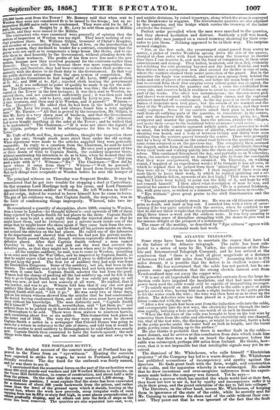THE PORTLAND MUTINY. The first detailed account of the convict
mutiny at Portland has ap- peared in the Times from an "eye-witness." Hearing the convicts were expected to strike for wages, he went to Portland, pocketing a friendly revolver. The day fixed for the outbreak was freely named, and he was there to see it.
"I ascertained that the numerical forces on the part of the authorities were about 200 civil guards and warders and 150 Wexford Militia in barracks, on the Verne Hill fortification, in course of construction, and about half a mile from the prison. On the other side the enemy mustered 1,500 strong. To understand the position, I must explain that the stone has been excavated for a distance of about 500 yards backwards from the prison, and rather lower than the level of the ground upon which it stands leaving at the curved face, where the work now proceeds, steep irregular walls of rock varying from ten to fifty or sixty feet high, in some places perpendicular, at °hers gradually sloping, and at others cut into the form of steps as the atone has been removed. The quarries are also separated into east, west,
and middle divisions, by raised tramways, along which the stone is conveyed to the Breakwater in waggons. The Government quarries are also adjoined by free quarries, and the bridge which carries the tramway of the latter overlooks the former." Perfect order prevailed when the men were marched to the quarries, but they showed hesitation and distrust. Suddenly a yell was heard, and some fifty men jumped on a raised tramway shouting for their com- rades to join them. Nothing appeared to be in their way. The surprise seemed complete.
"But, at the first rush, the prearranged signal passed from sentry to sentry, a picket of twelve Wexfords sprang down the side of the quarry, charged in close order with fixed bayonets along the tramway in shorter time than I can describe it, and met the band of conspirators, to their utter astonishment and dismay. They halted, hesitated, and then tied, evidently not relishing the cold gleaming bayonet and the loaded Enfield, and were then driven into a corrugated iron shed erected for shelter in case of rain, where the wanders chained them under protection of the guard. But in the meantime the bugle was sounded, and armed men sprang from behind the rocks and out of places of concealment, and before the main body of convicts had recovered from their first surprise every salient point was occupied, the communication between the quarries cut oft; a cross fire established from every side, and reserves held, in readiness to assist in ease of violence on any part of the works. The effect was instantaneous; the thrown-down pick and shovel were resumed with deep and sullen curses, and the captured prisoners marched off to confinement. As the day passed on small spasmodic rushes of desperate men took place, but the swords of the warders and the front of the Wexfords repressed any tendency to violence, and they were easily captured. Some of the convicts admit their plan to have been to rush from all outlying parts of the quarries, to concentrate in the centre, and arm themselves with the tools, such as hammers, picks, &c., then overpower and murder the guards, burn the prisons, plunder the villages, and make their escape to the mainland before assistance could arrive On Tuesday all the convicts appeared sulkily quiet, and proceeded to work as usual, but without any appearance of alacrity, when suddenly the same shouting was heard, and a body of between twenty and thirty were seen rushing from the western quarry towards the centre. These were promptly met by a body of Wexfords on the raised road between the quarries, and the same scene occurred as on the previous day. The conspiracy then assumed the dogged, sullen form of small numbers at a time or individuals throwing down their tools and walking quietly into the sheds and surrendering them- selves. Ilk continued throughout the day, and partially so on Wednesday, when, the convicts apparently no longer being able to resist the conclusion that they were overpowered, this subsided. On Thursday, on walking round, I inquired of an experienced warder if he thought it was all over, to which he replied that he judged from their phizzyhogs' that it was, as they were all so down in the mouth.' I then inquired if there were any more likely to leave their work, to which he replied (pointing out a re- markably athletic fellow, upwards of six feet hiah,) That man was waver- ing, but I have been trying to point out the folly of it, and hope he will not commit himself.' I then asked what description of man he was, and received for answer the following curious reply, is a natural Irishman, Sir, with gray eyes, as wicked as a foumart, and has often been in trouble.'" "Eye witness" gives great praise to the civil functionaries and the Wexfords.
"The sergeant particularly struck me. He was an old Ghuznee stormer, grim as death, and hard as bog oak. I sounded him with a view of ascer- taining if he was quite satisfied with the service, when he confided to me that he did not think it right that the prisoners should have p'huddn' (pud- ding) three times a•week and the soldiers none. It was very amusing to see his strong sense of discipline struggling with the desire to give vent to his intense delight at the prospect of a scrimmage." The cause of the mutiny, as described by "Eye witness" agrees with that of the official statement made last week.


























 Previous page
Previous page